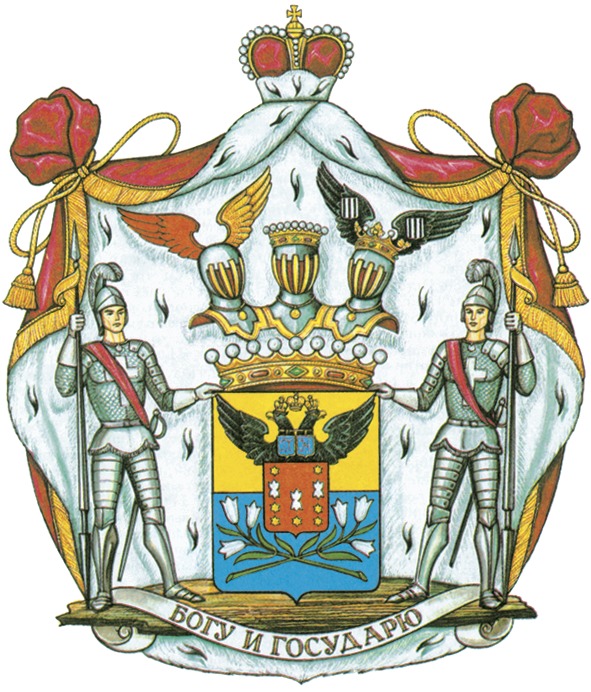What to read about Russia?
In this short thread I'll list some materials that would help to understand Russia better
History
If you want to learn more about Russian history, read Dominic Lieven's "Empire". Literally the best crash course on a national history I've read🧵
In this short thread I'll list some materials that would help to understand Russia better
History
If you want to learn more about Russian history, read Dominic Lieven's "Empire". Literally the best crash course on a national history I've read🧵

Although Lieven is British, his ancestors belonged to the Baltic German aristocracy. Lieven's forefathers were some of the largest landowners of the Russian Empire and occupied top positions at the St Petersburg court. See their coat of arms:
"To the God and the Sovereign"
"To the God and the Sovereign"

German influence may be the defining element of the entire Imperial period of the Russia history 1721-1917. At least many Russians including the aristocracy viewed it this way. Peter I got a lot of hate when he didn't confiscate Baltic German estates after the conquest of Baltics 

Foreign ambassadors talking to Russian nobles reported a lot of grudge against their emperor:
"Previous Tsars treated the conquered as the conquered and distributed their lands among us. But these Livonians are almost dancing on our heads. We all want him [Peter] dead"
"Previous Tsars treated the conquered as the conquered and distributed their lands among us. But these Livonians are almost dancing on our heads. We all want him [Peter] dead"

No wonder that utopian plans of Russian aristocratic conspirators have always been super anti-German. For example, Decembrists who tried to overthrow the Romanov regime in 1825 had two major secret societies: the northern (constitutional monarchy) and southern (republicans) 

The leader of Southern society, Pestel, was probably the first articulated Russian nationalist. He proposed to:
- Move capital inland to the truly Russian Nizhny Novgorod
- Change Western military uniform to the old Muscovite one
- Expel or exterminat Germans on Russian service
- Move capital inland to the truly Russian Nizhny Novgorod
- Change Western military uniform to the old Muscovite one
- Expel or exterminat Germans on Russian service

And who was Pavel Ivanovich Pestel himself, you may ask? Well, he was German. He was from a family that moved to Russia from Germany just few decades before. He was raised as a Lutheran, his birth name was Paul Burkhardt. He spent his teenage years studying in Hamburg and Dresden 

It was a German-educated, Lutheran-raised son of recent German immigrants that articulated the first program of Russian nationalism. That's very typical. If Turkish nationalism was modelled after the French, then Russian nationalist discourse is largely a copy paste of German one 

If a German led a republican conspiracy, then who was charged with investigating such rebels? Well, another German - Alexander von Beckendorff. A Baltic German who led Russian secret police. Btw his sister, Russian agent in London and Paris, was Dominic Lieven's direct ancestor 



As Veselovsky pointed out in 1918:
"Russians built the Russian Empire under the supervision of foreign, mostly German instructors and maintained it more with endurance, fertility and submission"
Btw I really recommend his works on Muscovite history. Especially Сошное письмо
"Russians built the Russian Empire under the supervision of foreign, mostly German instructors and maintained it more with endurance, fertility and submission"
Btw I really recommend his works on Muscovite history. Especially Сошное письмо

If Russian Empire was in fact a German empire, then it explains its quick collapse in WWI. Empire stood as long as Russians obeyed to their German masters. But in WWI Empire launched anti-German propaganda campaign which delegitimised the German rule within Russia. So empire fell 

I would also suggest some books that absolutely must be translated into English asap:
1. Bazhanov. I was Stalin's secretary
2. Aven. Time of Berezovsky
3. Khazin, Schegloff. A stairway to the sky
4. Roschin. The country of lost empathy
5. Pokrovsky. Russian history
1. Bazhanov. I was Stalin's secretary
2. Aven. Time of Berezovsky
3. Khazin, Schegloff. A stairway to the sky
4. Roschin. The country of lost empathy
5. Pokrovsky. Russian history
If you want to learn more of the USSR, read Bazhanov. In 1923 he became Stalin's secretary for the Politburo affairs. Back then Stalin was just one of major Kremlin bosses and fought for power with others. And Bazhanov helped him in this crucial period. In 1928 he escaped 

Bazhanov organised a "work trip" to Central Asia. From there he fled to Iran, then British India and finally to France. In France he published a book on his work as the Stalin's secretary. Let me quote just one episode from there
When Bazhanov became Stalin's secretary he would enter his cabinet for a dozen times a day to get his decision on this or that governmental request:
- Comrade Stalin, what will be your order?
- Well, what do you think yourself?
But Bazhanov had not authority to make a decision
- Comrade Stalin, what will be your order?
- Well, what do you think yourself?
But Bazhanov had not authority to make a decision

So Bazhanov would suggest a procedural decision:
- We must send it to Politburo/Central Committee/government/return it back to the agency to amend their proposal
- Do it then
What surprised Bazhanov is that Stalin wouldn't even open all those papers. He didn't care at all
- We must send it to Politburo/Central Committee/government/return it back to the agency to amend their proposal
- Do it then
What surprised Bazhanov is that Stalin wouldn't even open all those papers. He didn't care at all

Surprised Bazhanov discussed it with other members of Stalin's apparatus and they explained him that comrade Stalin doesn't read the papers and isn't interested in all this business.
That kinda made sense. And yet, what is he doing in his office all day?
That kinda made sense. And yet, what is he doing in his office all day?

Once Bazhanov enters Stalin's cabinet and sees him talking on a phone. Bazhanov stopped to let him finish and then make his report. Stalin was silent. One second, two, three. And then Bazhanov realised - he's not talking. He's listening 

Stalin had four phones on his table:
1. Central Committee
2. Upper Kremlin (nomenklatura offices)
3. Lower Kremlin (nomenklatura apartments)
4. Vertushka (around 80 top Soviet bosses)
These four lines was how he and other top soviet nomenklatura communicated with each other
1. Central Committee
2. Upper Kremlin (nomenklatura offices)
3. Lower Kremlin (nomenklatura apartments)
4. Vertushka (around 80 top Soviet bosses)
These four lines was how he and other top soviet nomenklatura communicated with each other

But all these four handsets remained on their places. The one Stalin was holding was an extra one and a cable from it was coming directly from his table, not from some phone.
Stalin looked at Bazhanov, Bazhanov looked at him and exited his office
Stalin looked at Bazhanov, Bazhanov looked at him and exited his office
That was kinda bad, but not that bad. After all, that's obvious that Stalin's secretary would sooner or later find it out. So Stalin saw it coming. Well, who should also know it? Other secretaries, who served Stalin for longer. Bazhanov approached Grigoriy Kanner (3) 

Kanner was Stalin's secretary for the secret police (ГПУ). At first he pretended he didn't know anything. But denying it was too stupid and he wanted to brag too much. So he told him the entire story
At some point Lenin was concerned that telephone girls who connect Soviet bosses with each other can listen to their talk. Indeed, all existing lines - Central Committee, Upper Kremlin and Lower Kremlin were manually operated. That was suboptimal. They needed an automatic line 

So Lenin commissioned Stalin with creating a new automatic line that would connect the top nomenklatura (Vertuskha). Since they would need to put most of Vertushka phones in Central Committee building, so it made sense to put in the same building, near Stalin's office
Kanner found a Czechoslovak Communist engineer, specialising on telephone lines and ordered him with setting up the entire system. He also commanded him to make a "control post" контрольный пост that would allow to join any talk and listen a supposably secure conversation
Official explanation was technical: in case of a system malfunctioning, we need to connect and find out where it's going wrong. And yet, this control post was set up in Stalin's office, in his own table. Bazhanov didn't know whether Kanner himself of a Czechoslovak did it
Once the system was set up, Kanner called Yagoda, the chief of secret police, and told him that that Czechoslovak is a spy and must be executed. Pagoda was concerned that he was a foreign communist and that could trigger an international scandal. But Stalin confirmed it 

According to Bazhanov, during his struggle for power in 1920s, Stalin was mostly listening to the communications of other Soviet leaders. They thought their discussion were secured, but they were not 

Bazhanov's book has tons of interesting material and must be translated. I'll finish the thread a bit later
Aven. Time of Berezovsky. This is a collection of interviews focused on the figure of Berezovsky. Unlike more famous Zygar's book, this is basically a collection of primary sources rather than a narrative. Absolutely recommend it to feel the vibe of Russian elites 

Stairway to Sky. That's an interesting book. First you see that it has two authors. The first is a well-known (within Russia) economist. The second is a noname from a provincial city. Which means it was the noname who wrote it 

Some would say it's a hyper cynical book on the elite dynamics. I will say it's a good glimpse into the Russian intellectual discourse, including the scope of the narrative, methods of argumentation, etc. I very much liked the book and value Schegloff's work
"Country of Lost empathy" might be the single best book to understand the modern Russian society. While there is a number of good studies on elites (whatever we mean by "elites" - from intellectuals to thieves-in-law), far fewer books deal with what the silent majority looks like 

Pokrovksy. Russian History. That's a very unusual study. Prerevolutionary Russian historiography had been imperialistic. Post-revolutionary one - schizophrenically imperialistic: e.g. Pugachev is cool, cuz he fought for the people. Suvorov is cool, cuz he expanded the empire 

Only for a short moment of time in 1920s non-imperialistic interpretations of Russian history had a chance. And that's when Pokrovsky's school emerged. That was perhaps the most brilliant and the most erudite narrative of the Russian history ever 

In many respect Pokrovsky anticipated the future world-systems theory model. Much of what Wallerstein would later come up to independently, was formulated much earlier by Pokrovsky. Except Pokrovsky's school was massacred in 1930s by Stalin so it didn't produce any lasting effect 

So my advice to general audience is: if you want to know more about Russia in general, read Lieven.
I would also ask interested publishers to consider translating to English:
Bazhanov
Aven
Schegloff
Roschin
Pokrovsky
Roschin might be the most important one right now
I would also ask interested publishers to consider translating to English:
Bazhanov
Aven
Schegloff
Roschin
Pokrovsky
Roschin might be the most important one right now
• • •
Missing some Tweet in this thread? You can try to
force a refresh





